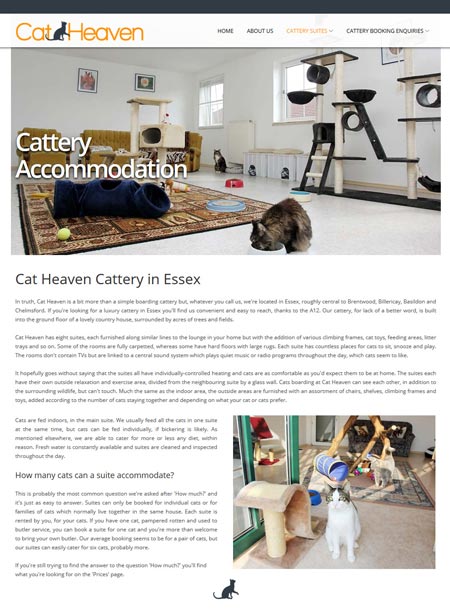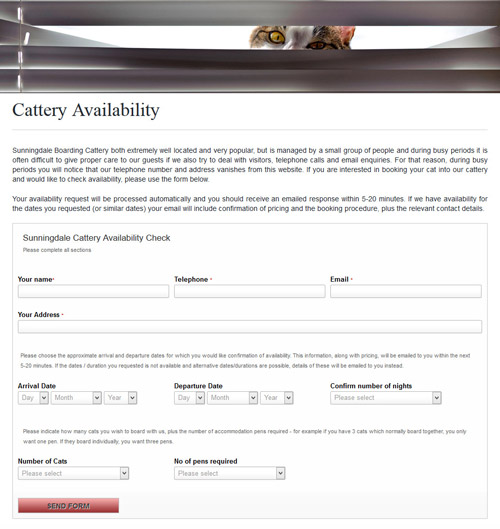Website Page Content
Writing content for your website

Website designers are obsessed with page contents, for good reason. When we talk about page content, we're talking about the text content of your pages. The reason is that the words on your page will have a huge say in deciding how successful your website is and, in particular, how it is rated by search engines such as Google. There isn't an 'optimum' number of words, no magic formula that will help you create the 'perfect page' or 'perfect website'. That said, when you think about what you want to say on each page, try to aim for at least 500 words per page. There isn't a fixed upper limit, but be sure to put the interesting stuff at the top of the page - even if Google measures the whole page, few people bother to read more than a few paragraphs.
You don't need to be a professional copywriter to create interesting pages, and nor do you need to write reams of text. If you ask us, we will edit and optimise your text in order to achieve the best results.
Where to start?
When people ask how to plan a website we often tell them to imagine they were designing a new house. However, when you sit down to write the text for your pages, it's better to think of your favourite shop or supermarket.
Standing in the street outside a shop, trying to decide whether to go in or keep walking, you often make your decision based on the shop windows. A good shop window tells you what you will find inside, and convince you to enter. The home page (called the index page) of your website needs to do the same thing. It helps greatly if it is attractive, but it also needs to tell people what the website contains and where they will find it. The average visitor to a website takes only a few seconds to decide if they like your website, and if it contains what they are looking for. They read the headlines, maybe skim-read the text and then either look for what they want on the navigation menu, or close the page and look somewhere else.
Don't forget Google
Although human visitors rarely read everything on a page, Google always does. Google doesn't care how ugly or beautiful your website is. It can't see to judge. What Google cares about is the written website content, how fast or slow your website is and whether it works well for both mobile and pc visitors. They read your pages and decide what the topic of each page is. Then, when people search for something online, Google knows which sites contain the right information, and displays them in a list.
We encourage clients to write at least 500 words of content for their website home page, more if possible. The most important content and key words should be placed near the top of each page, where visitors will find them easily.
Finding your way around..
Nobody wants to waste hours trying to find things in a supermarket. If you don't know where the salt is, you check the signs and follow them. Everything is well signposted and in a more or less logical place. Use this concept as a guide when writing your pages. Everything visible and in a logical place.
Other Page Contents
Most business websites have an 'about us' page which talks about the business or website in general. Theu often include details of the company background, staff experience and qualifications, and things like that. If you're not sure what to write, ask yourself what a visitor to your website would like to know about you or your business, then answer the question.
Look at an example..

The best way to illustrate the above is to give a simple example. Over the years we have created a lot of websites for kennels and catteries, so we'll use one of them as an example. Let's assume that you have a boarding kennels and cattery on the outskirts of Maidstone. The kennels was founded a few years ago, but now you want a website to help maintain or increase bookings. Maybe you've realised that advertising in the yellow pages just doesn't work anymore. You want people who visit the website to visit your facilities, but you're also quite happy to receive online availability or booking requests.
Aside from your home page and 'about us' page, you would have a 'kennels' page, focussed on your kennel facilities, with photos of the kennels or maybe previous guests. People arriving on your site probably expect to be told what the kennels accommodation is like, how big it is, if it is heated or has air conditioning, what facilities are provided, when and how often dogs are exercised, and so on. So, be sure that your kennels page explains all this. People might also wonder if pets are insured, what food choices are available and if you have kennels big enough for more than one dog sharing.
When somebody in Maidstone looks on Google for a local kennels, they probably type something like 'kennels in Maidstone' or 'Maidstone boarding kennels'. They might also use different town names, if they live outside Maidstone itself, so if you're within easy reach of other towns, remember to say this.
Use your kennels page to describe your kennels, not other things. Having described your kennels, now do the same for your cattery, remembering to use the same basic rule - answer the questions your visitors are likely to ask.
Other Pages

Having described your cattery and kennels, you might want to pages to provide additional information or details of others services, such as grooming, or your terms and conditions. You need people to visit your facilities, so you should have a 'how to find us' page with a map and some written instructions if you're not easy to find. You might want to have a prices page so, if you have one, think about what you want to include.
To enable site visitors to send booking enquiries, you'll need a reservations form or something similar, and maybe a general enquiries form. Booking or reservation forms generally request more information than simple enquiries forms and have a variety of fields for things such as name, address, phone numbers, age, sex and numbers of pets, booking dates and so on. All you need to do is tell us what information you want the form to collect. General enquiry forms usually include fields for a name, email address, phone number and the actual message, but that's up to you.
Some clients are wary of contact forms, thinking they will receive reams of spam emails. You don't need to worry. Firstly, the email address that these forms use are invisible. You can show a written email address if you want to, but it's not necessary. Secondly, our forms feature security measures which usually stop automatically generated spam. The only way your email account will start filling with spam is if a spammer visits your site in person and manually writes the email, which very, very few ever do.
